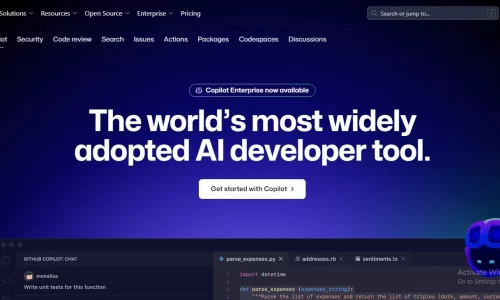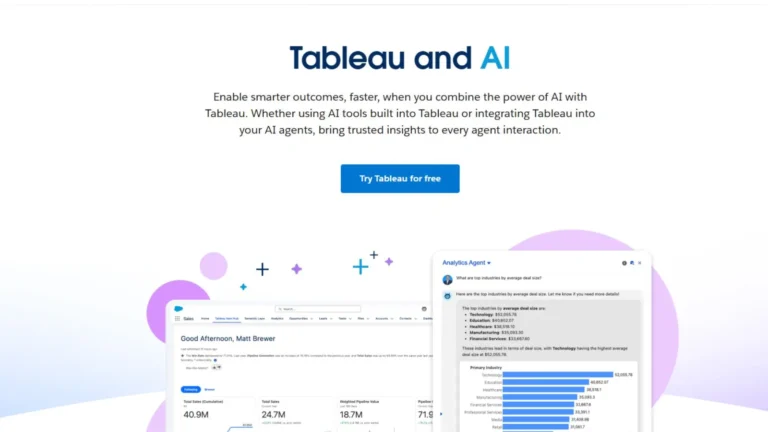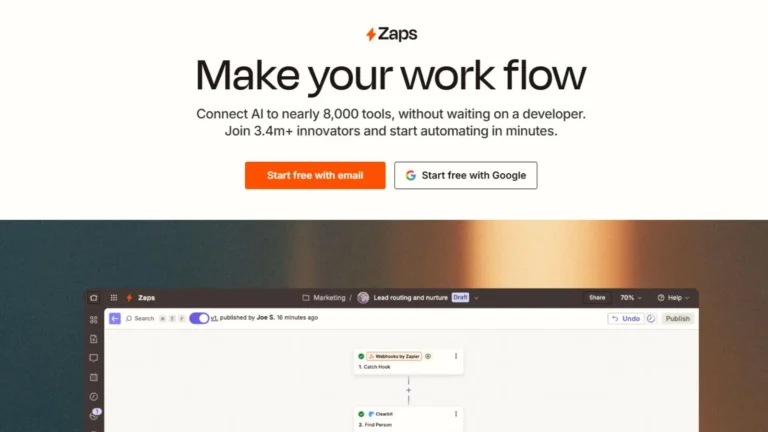Visit Tool
What is GitHub Copilot?
Ever wish you had a programming partner who could grasp what your code is saying, suggest the next line, or even finish the whole function through magic? Well, hello there to GitHub Copilot-a new AI-powered tool-a new way that has transformed how developers write code. GitHub Copilot is built on OpenAI’s Codex and operates as an old buddy sitting next to you, making insightful suggestions and writing code snippets in real-time.
Designed to help the developer write more effectively and efficiently, it is a powerful assistant for the programmer by giving them entire lines or blocks of code for exactly what you’re typing. It’s a game changer for software development in terms of offering customized support for a wide variety of programming languages and frameworks.
How GitHub Copilot Works
GitHub Copilot can be directly integrated into popular code editors including Visual Studio Code, Neovim, and the IDEs in JetBrains. It works in the background to analyze the context of your project-that is, the code you’ve already written, comments, or even a natural language description-as you write it. Then, it suggests options for you to choose, reject, or modify as you wish.
OpenAI has literally used its Codex at the heart of Copilot. Advanced in the artificial model of AI, it is trained on an immense dataset of open public code repositories from GitHub. Copilot reads syntax and patterns across different programming languages to predict the next line of code or function based on what you’re currently working on. Typically, its suggestions are more than just syntax; sometimes it could even bring in full-function implementations, error handling, and even optimized code for specific tasks.
Key Features in GitHub Copilot
- GitHub Copilot is very well-endowed with some impressive features that make it helpful to all developers. The interface will be indispensable for every developer:
- AI-driven Code Suggestions. Copilot gives you intelligent code suggestions that fit your project’s context. If you’re writing a very complicated algorithm or you just need to import a library, you can save your precious time, thanks to Copilot’s suggestions in real-time.
- This is not only limited to one or two programming languages. Rather it supports a great deal of languages and frameworks from around the world, including Python, JavaScript, TypeScript, Ruby, Go, PHP, C++, and many more. This wide range makes it quite useful for developers working on multiple projects.
- NLP: Copilot is very innovative because it’s built to understand natural language descriptions and comments. If you describe what a function should do in simple English, Copilot can write code based on what you intend, which means it makes it easier for you to code when solving a new problem or hopping from one project to another.
- Context Awareness: Copilot does not spit out boilerplate code. Instead it analyzes the context of your project and your own style of programming for intelligent suggestions. It learns by doing, becoming more attuned to your specific needs and preferences as you work.
- Error Handling Suggestions: Copilot can also suggest error-handling mechanisms beyond simple code completion. Imagine you are writing code that reads from a file or does some other operations that would involve file input/output or API calls. In this case, it might automatically open up try-catch blocks or null/undefined checks and thus prevent run-time errors.
Benefits of GitHub Copilot
For developers of any level, GitHub Copilot has a lot of benefits.
- BOOST Productivity GitHub Copilot speeds up the coding process. Developers are likely to spend lesser time on spelling and syntax and more on creativity and problem-solving since the platform provides suggestions of relevant code in real-time. This means developers can do more in less time.
- It reduces redundant work. There are numerous situations in coding that have redundant patterns, such as loop setup, constructing data structures, and writing generic functions. GitHub Copilot can save you time on such tasks by generating those blocks for you; thus, it erases tediously boring work allowing you to attend to more crucial aspects of your project.
- Educational Value: GitHub Copilot is also a learning resource for junior developers and any other developer who wishes to develop further. Through the suggestions it provides you, it teaches you about best practices, unknown languages, or new programming concepts. Developers may be exposed to lots of coding styles and techniques while trying out Copilot.
- Support of Multiple Programming Languages: The tool supports multiple programming languages. The developers may come up with a web application using JavaScript, or perhaps a machine learning model in Python. This is precisely why it has emerged as a versatile tool for developers working on diverse projects.
- Coding style adaptability: It learns in time with your style of coding as well as any other preferences you might have for the project. This will make the tool come up with contextual suggestions and even more fitted to your unique approach, thus facilitating increased productivity.
Limitations and Challenges
While as innovative as GitHub Copilot may be, there is still a limitation to the tool.
- Accuracy Variances: As suggested by Copilot, the accuracy of this is usually very good but not every time. There may be a moment when the AI may generate code that might not be the best and may miss some of those edge cases. Hence, developers have to keep their eyes open and really check the code for its accuracy.
- Dependence Risk: Copilot saves an incredible amount of time relative to coding, but it could lead users to rely too much on it. If users depend on Copilot to solve problems without really understanding the code behind the solution, then it may prevent developers-ultimately those who are still in the learning phase-from actually learning how to problem solve and think.
- Privacy and Licensing Issues: Some critics said that using Copilot had unethical implications due to its training data. Public source code along with proprietary codes used to train Copilot were both public and proprietary materials drawn from public source repositories, which have raised concerning debates it could sometimes accidentally suggest proprietary or copyrighted material. GitHub has addressed all these issues, but it is still under discussion in the developer’s community.
- Subscription Model: A lot of value means there is also a cost. The tool comes through a subscription model, which means not everyone may be able to afford it or justify the cost, particularly hobbyists and students. However, GitHub offers free trials and a discount specifically for students and open-source contributors.
GitHub Copilot is another big step into embracing AI in the software development process. It will ensure that developers focus on innovation and solving complex problems rather than wasting their time to understand syntax and repetitive tasks. To an extent, the limitation notwithstanding, AI tools like Copilot are certainly going to be a remake of the future of programming.
Of course, GitHub Copilot is a mighty assistant but not a substitute for human genius at this point in time. Developers would be right to temper their usage of Copilot with a healthy dose of critical thinking and a deep grasp of the principles behind coding. Used responsibly, GitHub Copilot promises to change the way we code, making software development more accessible, efficient, and above all fun.




